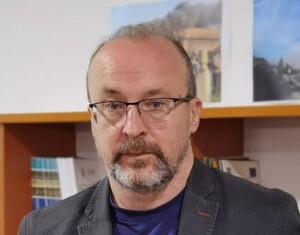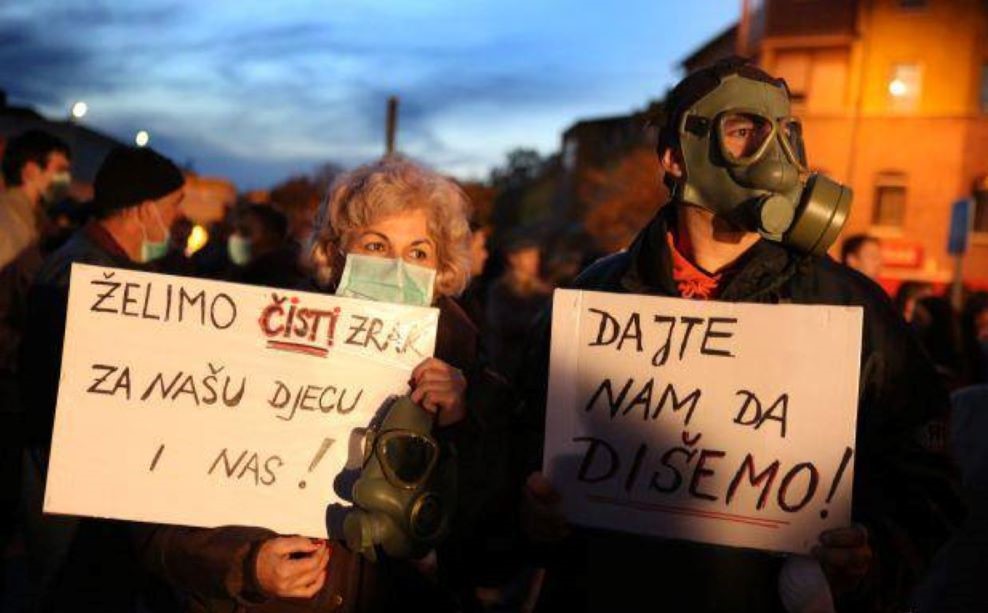The industry owners are international corporations, and state-owned thermal power plants are run by politicians. Both tend to take advantage of a lack of knowledge, fear, and mistrust to maintain the status quo.

Samir Lemes
Zenica has been a ferrous metallurgy hub for centuries, and it has struggled with industrial pollution for decades. The first air pollution tests in Bosnia and Herzegovina were run in Zenica back in 1954. After the state-owned steel factory, Zeljezara, was privatized, and it became apparent the new owner’s promises on investing in pollution reduction would not come to fruition as quickly as expected, Eco Forum Zenica was founded; a local organisation demonstrating citizen dissatisfaction, with the aim to put systemic pressure on the corporation and the governmental bodies.
The number of days with sulfur dioxide levels over the legal limit went up as high as 250 in a single year; it should not be over 3 days yearly. Hourly concentrations of SO2 were as high as 1,400 micrograms per cubic metre. Apart from SO2, the air in Zenica is polluted with particles of dust, and organic pollutants such as benzene. The government did not provide adequate support to help this matter.
The Eco Forum has launched numerous initiatives to urge federal, cantonal, and local governments to protect citizen health, most notably the protests of 2012 when thousands of Zenica locals took it to the streets to demand cleaner air. Pressuring ministries and inspectors, getting involved in the process of issuing environmental permits, taking meetings and launching media campaigns, are all activities which have not yielded the desired results.
Investigations against the highest level polluters and institutions have lasted as long as five years, prompted by Eco Forum’s suits. Nevertheless, those to blame for the polluted air, water, and soil were never brought to justice as there was never ‘enough evidence’, or there was ‘no intent’, or a ‘lack of awareness of any illegal activities by the actors’ – as stated by the defence.
Nevertheless, the pressure was not in vain. Albeit with delay, filters were placed on the high furnace and agglomeration machineries, a new heating plant was built, and filter installation in the steel factory has begun. All this halved the number of days with SO2 air pollution levels above the legal limit: in 2019, Zenica counted ‘only’ 117. This is still far from the magic allowance – 3 days a year, but this would not have happened had it not been for a decade long and consistent fight of the Eco Forum.
The Eco Forum is not only fighting for clean air in Zenica, but they have created a network of environmental protection organisations, launching and participating in numerous national and regional activities, most recent one being ‘Balkans United for Clean Air’.
The Balkans have been a symbol for conflict and lack of understanding for a long time. We are working on changing this perception, because the Balkans have the potential to become an example of cooperation and solidarity, if we were to overcome prejudice, corruption, and greed.
The greatest air polluters know no borders; the industry owners are international corporations, and state-owned thermal power plants are run by politicians. Both tend to take advantage of a lack of knowledge, fear, and mistrust to maintain the status quo. This campaign aims to spread information, quality ideas, and positive experiences, in order to overcome divisions and prejudice.
The Balkans are a small space, with limited resources, so we need to unite our progressive forces and show that we don’t always have to be at the top of the list for pollution, corruption, and ignorance. There are solutions, and we must take united action to decision makers, and urge them to implement the positive experiences here, at home, and help save our health.
Samir Lemes, Guest lecturer at the University of Zenica in the area of measuring techniques and computer simulations. Long term activist in the non-governmental organisation Eko Forum Zenica, awarded Environmental Protection Champion at the BiH Green Awards 2018.



Leave A Comment